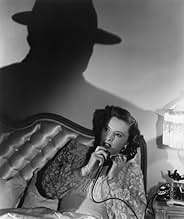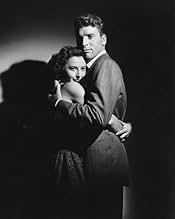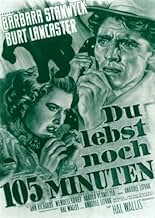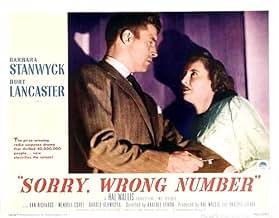VALUTAZIONE IMDb
7,3/10
13.509
LA TUA VALUTAZIONE
Mentre è al telefono, una donna invalida ascolta quello che lei pensa sia un complotto di omicidio e cerca di prevenirlo.Mentre è al telefono, una donna invalida ascolta quello che lei pensa sia un complotto di omicidio e cerca di prevenirlo.Mentre è al telefono, una donna invalida ascolta quello che lei pensa sia un complotto di omicidio e cerca di prevenirlo.
- Candidato a 1 Oscar
- 3 vittorie e 3 candidature totali
Bill Cartledge
- Page Boy
- (non citato nei titoli originali)
Cliff Clark
- Police Sergeant Duffy
- (non citato nei titoli originali)
Joyce Compton
- Cotterell's Blonde Girlfriend
- (non citato nei titoli originali)
Ashley Cowan
- Clam Digger
- (non citato nei titoli originali)
Yola d'Avril
- French Maid
- (non citato nei titoli originali)
Suzanne Dalbert
- Cigarette Girl
- (non citato nei titoli originali)
Recensioni in evidenza
Alfred Hitchcock himself praised this movie that was for him one of Barbara Stanwyck's most extraordinary parts.Besides,he did include Lucille Fletcher's short novel in his anthology "stories not for the nervous"(sic)
The story of this woman in her bed,who has heard on the phone someone is in danger,and who little by little discovers the horrible truth,is a first-class screen play which requires the viewer's attention,,or else he may lose the vital lead.The first people who enjoyed it had no pictures,since it was originally a radio broadcast,so they had to show a lot of imagination.The movie remains talky but the numerous flashbacks give it substance.The phone,is along with Stanwyck ,the star of Litvak's work;Burt Lancaster,a great actor though,only serves as a foil to both of them.50% of the dialogue consists of phone calls,that's what makes this thriller unique.
A strong connection with Hitchcock's work is the father's part(Ed Bigley).He is some equivalent of the Mother in many movies of his.The stuffed animals in his desirable mansion are a symbol of his daughter's lifelessness.(Coincidence?There will be such hunting trophies (and more) in his "psycho" twelve years later,and the topic is present in "the man who knew too much"(2nd version))
If you are fond of suspense,this is an unqualified must!
The story of this woman in her bed,who has heard on the phone someone is in danger,and who little by little discovers the horrible truth,is a first-class screen play which requires the viewer's attention,,or else he may lose the vital lead.The first people who enjoyed it had no pictures,since it was originally a radio broadcast,so they had to show a lot of imagination.The movie remains talky but the numerous flashbacks give it substance.The phone,is along with Stanwyck ,the star of Litvak's work;Burt Lancaster,a great actor though,only serves as a foil to both of them.50% of the dialogue consists of phone calls,that's what makes this thriller unique.
A strong connection with Hitchcock's work is the father's part(Ed Bigley).He is some equivalent of the Mother in many movies of his.The stuffed animals in his desirable mansion are a symbol of his daughter's lifelessness.(Coincidence?There will be such hunting trophies (and more) in his "psycho" twelve years later,and the topic is present in "the man who knew too much"(2nd version))
If you are fond of suspense,this is an unqualified must!
Barbara Stanwyck is marvellous! Although she's a rather unlikeable character, she thoroughly captivates your emotions. She drags you completely into her nightmare - you can't look away and like a real nightmare, the sense of not being in control is chillingly real.
Apart from the flashbacks, which epitomise the film noir tropes of the late forties, this film is Barbara Stanwyck alone and scared and trapped in her trappings of wealth. She's confined in the physical and mental luxury jail cell she's made for herself. It's an exceptional performance of a woman in despair driven to the edge, of knowing something awful is about to happen but not being able to do anything about it. It's a perfect example of how a film can stretch out tension and suspense tighter and more intense with each passing minute.
And I also loved it when in one of the flashbacks, Fred shouts to his wife: Hey Sally, Joe wants a bottle of beer and she obligingly dashes out to the shop: oh how 1940s!
Apart from the flashbacks, which epitomise the film noir tropes of the late forties, this film is Barbara Stanwyck alone and scared and trapped in her trappings of wealth. She's confined in the physical and mental luxury jail cell she's made for herself. It's an exceptional performance of a woman in despair driven to the edge, of knowing something awful is about to happen but not being able to do anything about it. It's a perfect example of how a film can stretch out tension and suspense tighter and more intense with each passing minute.
And I also loved it when in one of the flashbacks, Fred shouts to his wife: Hey Sally, Joe wants a bottle of beer and she obligingly dashes out to the shop: oh how 1940s!
Chrome-plated hokum, Sorry, Wrong Number works despite itself. And works and works. Starting out as a radio drama by Lucille Fletcher in the 1940s, it boasted umpteen performances plus a 1946 production in the nascent medium of television before Anatole Litvak turned it into film noir. During most of its earlier incarnations, Agnes Moorehead created the role of the hysterical, bedridden heiress, the `cough drop queen,' but the film fell into the lap of the First Lady of Film Noir, Barbara Stanwyck. Moorehead was more than a strong enough actress, but Hollywood required a star.
The Irony is that Sorry, Wrong Number is far from her finest hour on screen. Rarely has one been made so aware of Stanwyck `acting' in the most unabashedly actressy way. And the same can be said of Burt Lancaster who, when a role didn't set well with him, communicated his discomfort blatantly. In The Rose Tattoo, against Anna Magnani, he was ingratiating and unconvincing ; here, he's almost as awkward as the henpecked husband in whom the worm has at long last turned.
But maybe Fletcher's slice of devil's food cake calls for mannered histrionics. Ensconced in her bedchamber one sweltering Manhattan evening, her pill bottles and her telephone at her elbow, Stanwyck eavesdrops on a sinister conversation a murder is being plotted thanks to a crossed line. This makes her even more restive, and she starts working the phone, tracking down her tardy husband. Litvak `ventilates' these calls, turning them into a series of flashbacks filling in the background to what will prove a very bad evening for Stanwyck. (The sequences on Staten Island, however, could have sprung from the pen of Franklin W. Dixon, the Hardy Boys' puppeteer.)
Unavoidably talky, owing to its source, Sorry, Wrong Number moves inexorably to its preordained end. Basically, it's a gimmick, and one that Hitchcock might have fine-tuned into a nifty infernal machine. Litvak doesn't do badly, though, and the movie's shock value outlasts its staled conventions. Its most chilling moment comes when Stanwyck frantically dials a number that she thinks will give her solace. But her answer is `BOwery 2-1000 the City Morgue.'
The Irony is that Sorry, Wrong Number is far from her finest hour on screen. Rarely has one been made so aware of Stanwyck `acting' in the most unabashedly actressy way. And the same can be said of Burt Lancaster who, when a role didn't set well with him, communicated his discomfort blatantly. In The Rose Tattoo, against Anna Magnani, he was ingratiating and unconvincing ; here, he's almost as awkward as the henpecked husband in whom the worm has at long last turned.
But maybe Fletcher's slice of devil's food cake calls for mannered histrionics. Ensconced in her bedchamber one sweltering Manhattan evening, her pill bottles and her telephone at her elbow, Stanwyck eavesdrops on a sinister conversation a murder is being plotted thanks to a crossed line. This makes her even more restive, and she starts working the phone, tracking down her tardy husband. Litvak `ventilates' these calls, turning them into a series of flashbacks filling in the background to what will prove a very bad evening for Stanwyck. (The sequences on Staten Island, however, could have sprung from the pen of Franklin W. Dixon, the Hardy Boys' puppeteer.)
Unavoidably talky, owing to its source, Sorry, Wrong Number moves inexorably to its preordained end. Basically, it's a gimmick, and one that Hitchcock might have fine-tuned into a nifty infernal machine. Litvak doesn't do badly, though, and the movie's shock value outlasts its staled conventions. Its most chilling moment comes when Stanwyck frantically dials a number that she thinks will give her solace. But her answer is `BOwery 2-1000 the City Morgue.'
Sorry, Wrong Number (1948)
You can tell this thriller was once a radio play--it is mostly talk, and often over the telephone. But what drama can be built on a string of conversations around the office, in cars in the rain, out on a lonely beach on Staten Island, and on the telephone, often filled with mystery and doom.\
Not that it's not a visual movie, either. There is a big gloomy house, and lots of dark city streets. Shadows and moving camera and close-ups of faces and telephones, all keep you glued and increasingly worried. By the end, the really jarring, memorable end, you are ready for what you can never be ready for.
Beware, the plot is confusing. Even seeing it twice I had to pay attention to who was who, and what turn of events had just taken place. Part of the reason is there is a bewildering use of flashbacks, even flashbacks within flashbacks, told by all kinds of different characters. The plot is laid out methodically, but take notes as you go, or at least take note. The initial overheard phone call is key to it all, and it gets reinforced later somewhat, but pay heed there.
And the person on the phone? A sharp, bitter, convincing Barbara Stanwyck, who really knows how to be steely and vulnerable at the same time. Burt Lancaster is more solid and stolid, and maybe less persuasive overall, but he carries a more practical part of the story. It keeps coming back to Stanwyck in bed, and the telephone which is her contact with the facts, as they swirl and finally descend.
Director Anatole Litvak has some less known but thrilling dark dramas to look for, including Snake Pit. But this is his most sensational winner, partly for Stanwyck, and partly for the last five minutes, which is as good as drama gets.
You can tell this thriller was once a radio play--it is mostly talk, and often over the telephone. But what drama can be built on a string of conversations around the office, in cars in the rain, out on a lonely beach on Staten Island, and on the telephone, often filled with mystery and doom.\
Not that it's not a visual movie, either. There is a big gloomy house, and lots of dark city streets. Shadows and moving camera and close-ups of faces and telephones, all keep you glued and increasingly worried. By the end, the really jarring, memorable end, you are ready for what you can never be ready for.
Beware, the plot is confusing. Even seeing it twice I had to pay attention to who was who, and what turn of events had just taken place. Part of the reason is there is a bewildering use of flashbacks, even flashbacks within flashbacks, told by all kinds of different characters. The plot is laid out methodically, but take notes as you go, or at least take note. The initial overheard phone call is key to it all, and it gets reinforced later somewhat, but pay heed there.
And the person on the phone? A sharp, bitter, convincing Barbara Stanwyck, who really knows how to be steely and vulnerable at the same time. Burt Lancaster is more solid and stolid, and maybe less persuasive overall, but he carries a more practical part of the story. It keeps coming back to Stanwyck in bed, and the telephone which is her contact with the facts, as they swirl and finally descend.
Director Anatole Litvak has some less known but thrilling dark dramas to look for, including Snake Pit. But this is his most sensational winner, partly for Stanwyck, and partly for the last five minutes, which is as good as drama gets.
A woman confined to a bed overhears a murder plot on a crossed telephone line and tries to alert the police. The plot structure is quite convoluted, with most of the story told in flashbacks. In fact there are flashbacks within flashbacks, making it somewhat hard to follow. The audience is supposed to feel sympathy for Stanwyck, but the character is too self-centered and whiny for that to happen. Given her character's propensity for histrionics, the actress manages to keep her performance somewhat controlled; Lancaster is fine as her trophy husband. Litvak creates a good film noir atmosphere, although at times his camera roams aimlessly, becoming a distraction.
Lo sapevi?
- QuizAnatole Litvak: When Henry is having lunch with Sally, he asks the waiter if he knows who the gentleman is in the dark glasses at the table behind him. It's the director of the film.
- BlooperTwice, Leona turns on a radio, and music begins instantly and strongly. Radios of the film's era contained vacuum tubes that needed some time to warm up.
However, this would be filmmaker's prerogative, not wanting to slow the pace of the film with extended silence.
- Citazioni
Henry Stevenson: [to Leona] I want you to do something. I want you to get yourself out of the bed, and get over to the window and scream as loud as you can. Otherwise you only have another three minutes to live.
- Curiosità sui creditiPROLOGUE: "In the tangled networks of a great city, the telephone is the unseen link between a million lives...It is the servant of our common needs-the confidante of our inmost secrets...life and happiness wait upon its ring...and horror...and loneliness...and...death!!!"
- ConnessioniEdited into Il mistero del cadavere scomparso (1982)
I più visti
Accedi per valutare e creare un elenco di titoli salvati per ottenere consigli personalizzati
- How long is Sorry, Wrong Number?Powered by Alexa
Dettagli
- Data di uscita
- Paese di origine
- Lingua
- Celebre anche come
- Al filo de la noche
- Luoghi delle riprese
- Hollywood, California, Stati Uniti(telephone switchboard at a telephone company office on Gower St.)
- Azienda produttrice
- Vedi altri crediti dell’azienda su IMDbPro
Botteghino
- Lordo in tutto il mondo
- 1974 USD
- Tempo di esecuzione
- 1h 29min(89 min)
- Colore
- Proporzioni
- 1.37 : 1
Contribuisci a questa pagina
Suggerisci una modifica o aggiungi i contenuti mancanti

























